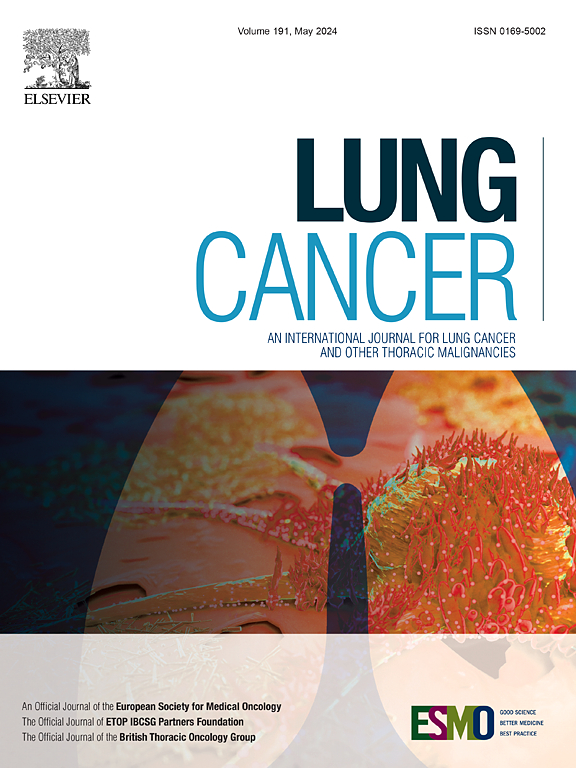B7-H3和DLL3表达对广泛期小细胞肺癌PD-L1阻断治疗疗效的影响
IF 4.4
2区 医学
Q1 ONCOLOGY
引用次数: 0
摘要
db7 - h3和δ样配体3 (DLL3)是广泛期小细胞肺癌(ES-SCLC)的新治疗靶点。我们旨在评估B7-H3和DLL3表达对肿瘤免疫微环境(TME)的影响以及程序性细胞死亡配体1 (PD-L1)阻断对ES-SCLC的治疗效果。患者和方法共分析了146例接受铂基化疗的ES-SCLC患者,其中包括(Chemo + ICI队列)或未(Chemo队列)免疫检查点抑制剂。根据免疫组织化学检测B7-H3或DLL3的表达情况,评估各队列的无进展生存期(PFS)和总生存期(OS)。通过免疫相关基因表达谱(irGEP)评估B7-H3或DLL3表达与TME特征的关系。结果在Chemo + ICI队列中,B7-H3高表达患者的PFS(中位数为4.3比5.4个月;HR为2.11,95% Cl为1.08-4.10,P = 0.03)和OS(中位数为8.4比14.2个月;HR为1.83,95% CI为0.91-3.69,P = 0.09)均短于B7-H3低表达患者。在化疗组中,B7-H3高表达组和低表达组的生存结果无明显差异。irGEP分析显示,在B7-H3高表达的肿瘤中,CD8+ T细胞的效应功能受损。治疗效果与DLL3表达状态无明显相关性。结论B7-H3高表达可能通过促进ES-SCLC的T细胞功能障碍而成为PD-L1抗体治疗的耐药机制。本文章由计算机程序翻译,如有差异,请以英文原文为准。
Impact of B7-H3 and DLL3 expression on the efficacy of PD-L1 blockade therapy in extensive-stage small cell lung cancer
Background
B7-H3 and delta-like ligand 3 (DLL3) are novel therapeutic targets in extensive-stage small cell lung cancer (ES-SCLC). We aimed to assess the impact of B7-H3 and DLL3 expression on the tumor immune microenvironment (TME) and on the therapeutic efficacy of programmed cell death–ligand 1 (PD-L1) blockade for ES-SCLC.
Patients and methods
A total of 146 ES-SCLC patients who received platinum-based chemotherapy either with (Chemo + ICI cohort) or without (Chemo cohort) an immune checkpoint inhibitor was analyzed. Progression-free survival (PFS) and overall survival (OS) were evaluated in each cohort according to B7-H3 or DLL3 expression status as detected by immunohistochemistry. The relation of B7-H3 or DLL3 expression to characteristics of the TME was assessed by immune-related gene expression profiling (irGEP).
Results
In the Chemo + ICI cohort, patients with high B7-H3 expression showed a shorter PFS (median of 4.3 vs. 5.4 months; HR of 2.11 with a 95 % Cl of 1.08–4.10; P = 0.03) and OS (median of 8.4 vs. 14.2 months; HR of 1.83 with a 95 % CI of 0.91–3.69; P = 0.09) than those with low B7-H3 expression. In the Chemo cohort, there was no apparent difference in survival outcomes between the high and low B7-H3 expression groups. The irGEP analysis revealed that the effector function of CD8+ T cells was impaired in tumors with high B7-H3 expression. No clear association was apparent between therapeutic efficacy and DLL3 expression status.
Conclusions
High B7-H3 expression may serve as a resistance mechanism for PD-L1 antibody therapy by promoting T cell dysfunction in ES-SCLC.
求助全文
通过发布文献求助,成功后即可免费获取论文全文。
去求助
来源期刊

Lung Cancer
医学-呼吸系统
CiteScore
9.40
自引率
3.80%
发文量
407
审稿时长
25 days
期刊介绍:
Lung Cancer is an international publication covering the clinical, translational and basic science of malignancies of the lung and chest region.Original research articles, early reports, review articles, editorials and correspondence covering the prevention, epidemiology and etiology, basic biology, pathology, clinical assessment, surgery, chemotherapy, radiotherapy, combined treatment modalities, other treatment modalities and outcomes of lung cancer are welcome.
 求助内容:
求助内容: 应助结果提醒方式:
应助结果提醒方式:


